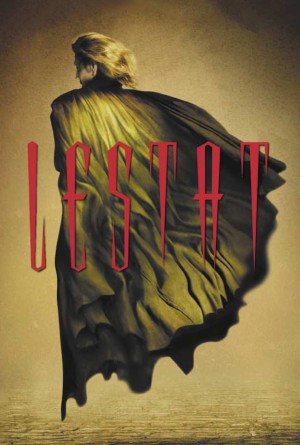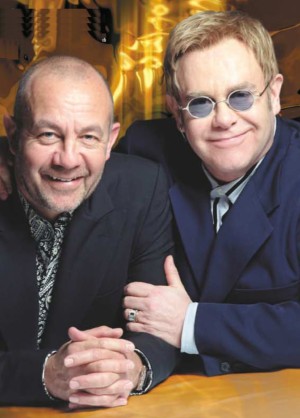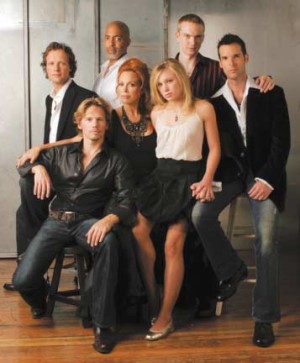|
| Home | News | Tour | Charts | Board | Archive | Shop | Links | FAQ | Contact |
| ELTON JOHN NEWS |
| Creating Lestat and Louis Wednesday, December 14 2005 |
By Anne Rice - with comments by Elton John and Bernie Taupin.

Go back. The quiet of the night in Berkeley, California in 1969 I was sitting there at the typewriter in the precious time, after the routine work of life was finished, and thinking: “What would it be like if you could get a vampire to tell you just what it was like? If you could get him to explain the relationship between himself and his victim -- I mean, getting that close to someone unique and living and loving, and then taking that life. What is this like?” I began to write the short story: “Interview with the Vampire.”
 Flash forward to 1972. I’d done about three drafts. We were in the living room of our apartment in Berkeley, and a friend said: “I think you have something there, something you can really go with.” Just a few words. Were they determinative? I don’t know. What happened was this. I started to re-write the story for a collection of stories. And the rest of the collection fell away. I was in the story with Louis, and he had a name for the first time, and then came Lestat, the maker, a blaze into which I never really looked, a blaze that kept growing as I was Louis, being made a vampire, being forced out into a great gloom in which despair seemed the inevitable verdict. Louis refused the verdict. Louis demanded that life mean something, no matter how monstrous he was, no matter how brutal and indifferent the universe seemed. On and on, I was Louis; but there was Lestat exploding, filling the developing novel with a great pervasive heat. There was Lestat suddenly dancing under the gaslamp, cape flaring, mocking the passersby. Louis told his story. Lestat was vanquished -- punished maybe for having created Louis and the child vampire Claudia as monsters. But Lestat never really gave up; Lestat wasn’t finished. Lestat was the fire that never went out, and then years later roared into the conflagration that was the second book, Lestat’s own book, the story of one who was determined to be good at being bad, if that was what he had to do, Lestat, made a monster against his will, and insisting: “I will be the hero of this, you understand me? I will never grieve for myself .” It was Lestat who saw the world as the Savage Garden, and spoke of Hell’s Bells echoing in his mind, bells calling him to be strong, to go forth, to do what he must do to be ever more bright and fierce and irresistible in the seeming chaos and beauty that surrounded him.
Flash forward to 1972. I’d done about three drafts. We were in the living room of our apartment in Berkeley, and a friend said: “I think you have something there, something you can really go with.” Just a few words. Were they determinative? I don’t know. What happened was this. I started to re-write the story for a collection of stories. And the rest of the collection fell away. I was in the story with Louis, and he had a name for the first time, and then came Lestat, the maker, a blaze into which I never really looked, a blaze that kept growing as I was Louis, being made a vampire, being forced out into a great gloom in which despair seemed the inevitable verdict. Louis refused the verdict. Louis demanded that life mean something, no matter how monstrous he was, no matter how brutal and indifferent the universe seemed. On and on, I was Louis; but there was Lestat exploding, filling the developing novel with a great pervasive heat. There was Lestat suddenly dancing under the gaslamp, cape flaring, mocking the passersby. Louis told his story. Lestat was vanquished -- punished maybe for having created Louis and the child vampire Claudia as monsters. But Lestat never really gave up; Lestat wasn’t finished. Lestat was the fire that never went out, and then years later roared into the conflagration that was the second book, Lestat’s own book, the story of one who was determined to be good at being bad, if that was what he had to do, Lestat, made a monster against his will, and insisting: “I will be the hero of this, you understand me? I will never grieve for myself .” It was Lestat who saw the world as the Savage Garden, and spoke of Hell’s Bells echoing in his mind, bells calling him to be strong, to go forth, to do what he must do to be ever more bright and fierce and irresistible in the seeming chaos and beauty that surrounded him.Why were these characters born? Why were they everything that I knew? Why was I able to talk about what mattered to me when they started talking? Fantasy, the much abused word, was merely a doorway through which I walked to enter my reality: a doorway to the place where I could bring it all together, where I could say: I will be the hero of this, you understand me?”
 Our Finest Work
Our Finest WorkBy Elton John
Interview with the Vampire has long been one of my favorite books and Anne Rice one of my favorite writers. Being able to combine these worlds into one piece of musical theater has been enormously fulfilling for me and one of the highlights of my professional career. I’m tremendously proud of Lestat. I first discovered the joys of writing for the theater when I worked on The Lion King, Aida and Billy Elliot. With Lestat, it’s a whole new experience as I’ve had the chance to work with my writing partner, Bernie Taupin, on his first musical, which makes it all the more special. I’m extremely confident that this is our finest work.
A Non Vampire Vampire Musical
By Bernie Taupin
Anne Rice’s stories have always been for me more than simply tales of vampires adrift through the centuries. I have never found anything remotely clichéd about her immortals. They are in many ways more human than most of those they take in order to survive. Their senses are heightened, so their passions and the moral issues they face become magnified to a surreal intensity. This to me is what the show embodies, a moral man in an amoral world.
 The traditional world of the vampire was turned upside down by Anne Rice. Her characters are sleek and sexy, infused with all the complexities of history’s great heroes. No Lugosi– pale and veiled by his cape, no hissing “Hammer” villains, in fact none of the undead’s traditional accoutrements. I suppose what I’m saying is that this could be labeled a “non-vampire, vampire musical.” Strange as it may seem it’s oddly true.
The traditional world of the vampire was turned upside down by Anne Rice. Her characters are sleek and sexy, infused with all the complexities of history’s great heroes. No Lugosi– pale and veiled by his cape, no hissing “Hammer” villains, in fact none of the undead’s traditional accoutrements. I suppose what I’m saying is that this could be labeled a “non-vampire, vampire musical.” Strange as it may seem it’s oddly true.We have gone out of our way to stage something that is a composite of rich history and contemporary stylization melded with extraordinary graphic images. I am aware that skepticism is inevitable. After all, the immediate image of singing vampires can induce a veritable wave of hilarity and sarcasm. I’ve no argument other than I think you’ll be surprised how well it works and how natural it seems. Our vision has always been a stylish, sexy, intelligent show that is stripped of gothic clichés and that displays the vampire dealing with his damnation on a startlingly realistic and human level. Writing the songs for this show has been one of the most enjoyable experiences of my career. I was terrified at first and found the whole process daunting.
I do after all come from a background of rock where the 4-minute fix is a staple of the genre. Please let me make this clear: this is not a rock opera.
| Related News |
Thursday, December 8 2005 at 22:01:44
Friday, November 11 2005 at 08:56:24
Wednesday, October 26 2005 at 10:46:54
Tuesday, September 27 2005 at 10:44:16
Wednesday, August 24 2005 at 13:44:57
Saturday, April 16 2005 at 07:40:12
Tuesday, November 4 2003 at 11:45:07
Tuesday, May 6 2003 at 19:45:38

© 1997-2017 by HERCULES International. Hercules is not affiliated with Elton John`s management or the Elton John Aids Foundation. Please note that this site has been discontinued on March 31, 2017 and will not be updated anymore. |